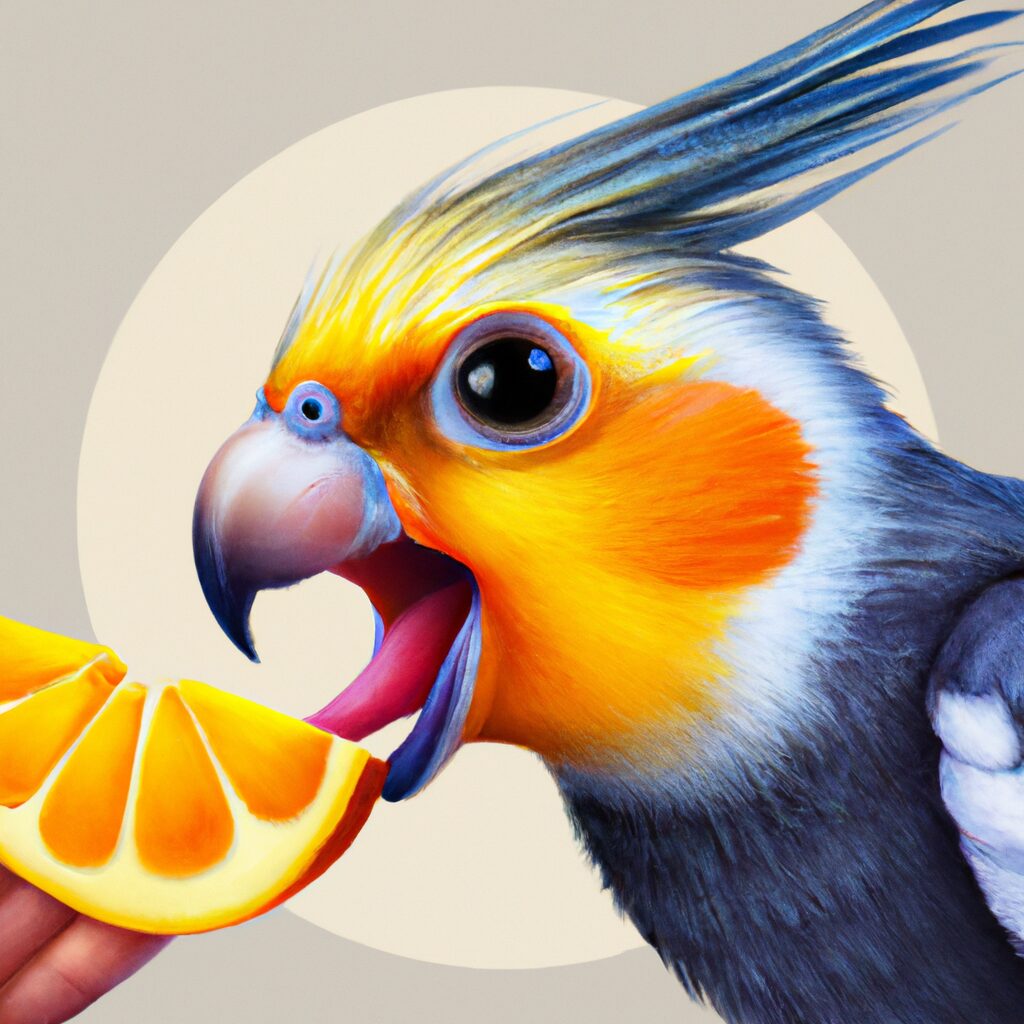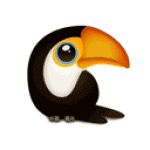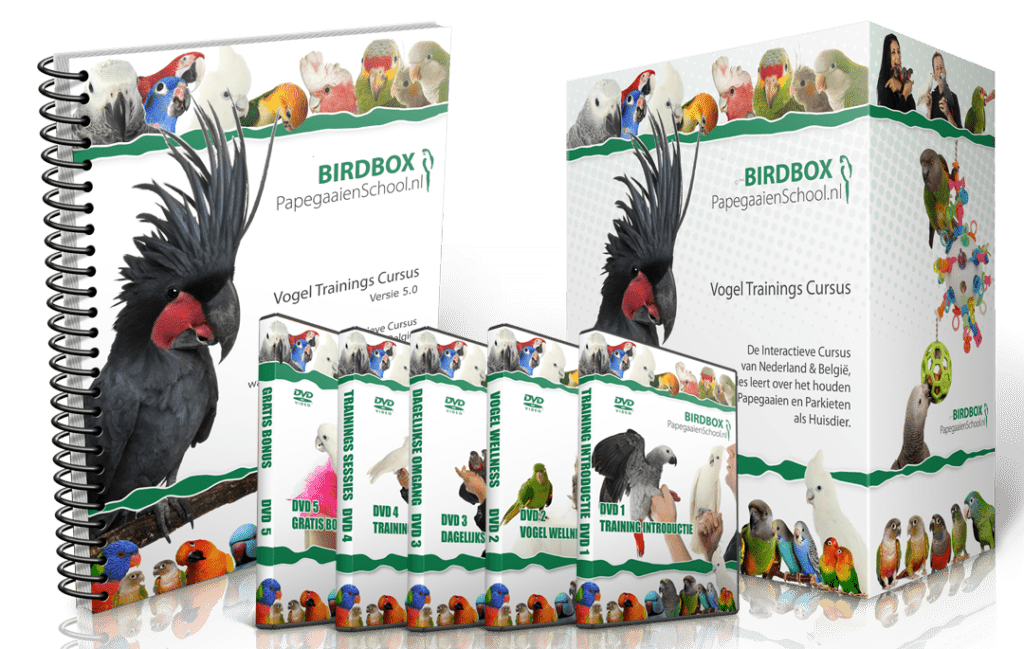

Can cockatiels eat oranges?
To learn whether oranges are safe for cockatiels, we’ll explore what cockatiels are and their nutritional requirements. Then, we’ll take a look at what fruits are safe for cockatiels to consume without any harm, followed by an investigation into whether oranges are suitable for them.
What are cockatiels?
Cockatiels are small, social parrots from Australia. They make great pets, with their friendly personalities and unique head crests which they can raise or lower. Plus, they can learn words and songs!
To keep them healthy, feed them a balanced diet of seeds, fruits, veggies and pellets. But watch out – oranges aren’t toxic, but they’re high in citric acid which can cause digestive problems in some birds.
Daily care is important for cockatiels. Keep their cage clean and give them plenty of playtime outside. Stimulating their minds and providing exercise are key.
One pet owner loved how her cockatiel would mimic the sound of knocking on a door when someone approached its cage. Showing off its learning and imitating skills. With proper care and affection, cockatiels make great pets. Why worry about nutritional requirements when your cockatiel can just steal your orange slices like a pro?
Nutritional requirements of cockatiels
Cockatiels have unique dietary needs to keep their immune systems healthy and avoid health issues. For a balanced diet, protein, fiber, vitamins, and minerals are essential. Make a table with the needed nutrients on one side (e.g. carbs, fats, vitamins A, E, B12, calcium, phosphorus) and food sources on the other (seeds/nuts for fat, leafy greens for fiber). Water is also important as they don’t get enough from food.
| Essential Nutrients | Food Sources |
|---|---|
| Protein | Beans, Lentils, Quinoa, Soybeans, Tofu |
| Fiber | Broccoli, Sweet Potatoes, Red Peppers, Carrots, Spinach |
| Vitamin A | Sweet Potatoes, Carrots, Mangoes, Apricots, Spinach |
| Vitamin E | Nuts (Almonds, Hazelnuts), Fish, Avocado, Broccoli, Spinach |
| Vitamin B12 | Eggs, Cheese, Fortified Cereal, Unsweetened Soy Milk, Yogurt |
| Calcium | Cheese, Yogurt, Fortified Orange Juice, Fortified Soy Milk, Leafy Greens (Kale, Spinach, Collards) |
| Phosphorus | Chicken, Turkey, Lean Beef, Lentils, Nuts and Seeds |
For over 200 years, Cockatiels have been kept as companions due to their friendly nature and mimicking abilities. Feed them right and they’ll be happy and healthy, with a longer lifespan! Don’t forget the fruits too!
Fruits that cockatiels can eat
Do you know what fruits your cockatiel can eat? Here’s a guide to help! Here are five: apples, bananas, strawberries, mangoes, and grapes. These are all good sources of vitamins and fiber. But, don’t feed them too much – stick with appropriate portion sizes.
Also, feeding your cockatiel fruits is a great way to bond with them. In ancient times, birds were often used as messengers. Even Christopher Columbus took African parrots on his voyages. They were valued for their ability to mimic human language.
As long as it’s given in moderation, oranges are safe for your cockatiel too. Enjoy the sweet moments!
Are oranges safe for cockatiels?
Can your cockatiel eat oranges? Although birds love fruits, the acid content of oranges can cause digestive problems in cockatiels. Oranges have Vitamin C and antioxidants – great for health if given in moderation. Always make sure their diet includes a balanced mix of seeds and pellets, and occasionally fresh fruits.
For a citrusy twist, try apples, pears, or bananas. They are rich in Vitamin A and C. One pet lover’s cockatiel enjoyed slices of freshly cut oranges and playing with the rind. Remember to wash the fruit before offering it to any bird. Why limit them to a seed diet when they can enjoy oranges? Cockatiels now have more Vitamin C than usual!
Benefits of oranges for cockatiels
To understand the benefits of oranges for your cockatiel, explore the reasons why they make for a great addition to their diet. With a high volume of Vitamin C content, oranges can further aid in boosting your pet’s immune system while providing anti-inflammatory properties. Promoting digestion is another benefit of oranges.
Vitamin C content in oranges
Oranges for Cockatiels: A Burst of Vitamin C!
Oranges are rich in vitamin C, making them great for cockatiels’ health. This vitamin strengthens immunity, fights infections and viruses, and prevents eye diseases and skin issues.
Vitamin C Content in Oranges
Check out the table below to see the vitamin C content of oranges based on size:
| Orange Size | Vitamin C (mg) |
|---|---|
| Small | 51 |
| Medium | 70 |
| Large | 93 |
Remember to feed oranges carefully, as cockatiels can get diarrhea from overeating.
Unique Benefits
Not only does orange provide vitamin C, but it also contains flavonoids. These help reduce inflammation, promote heart health, and prevent cancer.
Pro Tip
Remove all the orange seeds before feeding them to your cockatiel. These can cause choking hazards or stomach blockages if ingested.
Boosting the immune system
The influence of citric fruits on a cockatiel’s immune system is remarkable! Here are a few reasons why oranges should be a part of your pet’s diet:
- Vitamin C helps strengthen immunity.
- Flavonoids protect cells from damage and boost immunity.
- Carotenoids and phenolics fight against viruses and infections.
- Fiber supports gut health for easy digestion.
- Natural sugars give energy for activity and overall good health.
However, it is vital to keep in mind that too many oranges can cause digestive issues. Moderation is key when introducing new foods.
Surprisingly, the scent of oranges alone can have a positive effect on birds. It can lift their mood and reduce stress levels.
A study at Plymouth University revealed that birds exposed to orange aromas had lower stress and fewer negative behaviours than those in a neutral environment. This implies that adding orange-scented items to their environment may benefit their overall wellbeing.
Eating oranges may not make your cockatiel fly, but it might just make them feel like they can!
Anti-inflammatory properties
Oranges are great for cockatiels! Vitamin C helps their immune system and reduces inflammation. Plus, there are natural compounds like flavonoids, carotenoids, hesperidin, and limonene that have anti-inflammatory effects.
But beware: too many oranges can cause digestive issues, so it’s best to provide fresh fruit, free of pesticides and chemicals. Limit their intake for optimal health!
Promoting digestion
Oranges could be great for a cockatiel’s digestion. The acidity boosts good bacteria and reduces bad bacteria, aiding digestion. Plus, the high fiber content helps stop constipation and diarrhea.
Adding oranges to a cockatiel’s diet can have a good effect. But, it’s best to give them in moderation as they are high in sugar. A small piece or slice once or twice a week is recommended.
If your cockatiel has a bad reaction to oranges, like vomiting or diarrhea, stop giving them oranges and speak to a vet.
A bird owner saw their cockatiel had digestion issues, even though they ate healthy. After introducing oranges in moderation, they saw an improvement in their digestion and health.
Giving oranges to birds may lead to a juicy addiction!
Risks of feeding oranges to cockatiels
To learn about the risks of feeding oranges to your cockatiels, read on. Oranges can be hazardous to your pet birds health due to their high sugar content. Feeding oranges to cockatiels can also result in potential acid reflux, not to mention the possibility of allergic reactions.
High sugar content in oranges
Orange’s sugar content is too much for cockatiels! Feeding them this fruit can be dangerous. Here’s why:
- Fructose leads to liver problems and obesity.
- Abnormal blood sugar levels can be caused by too much sugar.
- The acidity in oranges can irritate the digestive tract, causing vomiting and diarrhea.
- Excess oranges can make them more thirsty, risking dehydration.
- Eating too many oranges can reduce the bird’s appetite for other vital nutrition.
Before giving any fruit, think of the risks! Choose fruits with lower sugar than oranges for treats.
Pro Tip: Keep your pet bird healthy with fresh fruit, vegetables, legumes, grains, seeds and calcium-rich foods.
Potential acid reflux in cockatiels
Cockatiels may suffer digestive issues when they eat oranges, as they contain high amounts of acid. This acid can cause acid reflux, leading to vomiting, discomfort, and other issues.
It’s best to limit oranges or other fruits with acidic content when feeding them to cockatiels. Too much can damage their health.
Also, it’s wise to consult a vet before feeding these fruits to your bird. They can tell you how much and how often it’s safe to do so.
Pro Tip: Give your bird fresh water alongside oranges or other citrus fruits to reduce their chances of stomach-related issues.
If your bird sneezes after eating oranges, don’t worry – it’s just an allergic reaction to the citrus!
Allergic reactions
Citrus fruits can trigger adverse reactions in cockatiels. The acidity could irritate their crop, leading to inflammation and digestive issues. In some cases, it may cause dermatitis or breathing problems.
Plus, some chemicals in oranges may be toxic. Psoralen may cause sunburns and eye damage when exposed to sunlight.
But some oranges, like blood oranges, are okay for birds. They have lower acid content.
It’s important to follow diet guidelines when feeding pet birds. Make any changes slowly and consult a vet first.
Also, give your pet bird fresh water all the time. Remove any uneaten fruits or veggies from the cage right away.
Don’t put your pet bird’s health in danger by offering the wrong food. Always be careful when selecting foods for avian companions, as an allergic reaction can be serious.
How to feed oranges to cockatiels
To feed your cockatiel oranges, you need to know how to prepare them and in what quantity. In this solution, “How to feed oranges to cockatiels,” we introduce you to preparing oranges for cockatiels and ways to decide the frequency and portion size of feeding oranges to your cockatiel. Observing the reactions of your cockatiel while feeding oranges is also important.
Preparing oranges for cockatiels
Cockatiels love their oranges! Here’s how to prepare them safely and healthily.
- Wash the orange to remove any pesticides or dirt.
- Cut it into slices or wedges.
- Remove any seeds; they can be toxic and pose a choking hazard.
- Discard the skin; it’s hard for birds to digest.
- Chop up the orange pieces into smaller portions.
- Offer them as a treat, but in moderation. Too much fruit can lead to health problems.
Keep in mind: too much citrus can cause digestive issues. And avoid juice or anything high in sugar; that can lead to diabetes.
A fellow bird owner shared a hilarious story of her cockatiel getting obsessed with an orange slice. Moderation is key when giving treats to your feathered friend.
Feeding your cockatiel oranges? Keep it in moderation – or you’ll end up with a citrusy Napoleon!
Frequency and portion size of feeding oranges
For cockatiel well-being, a balanced diet is key. Oranges can be a tasty treat, but portion size and frequency is important. A table with frequency, portion size, and notes can help pet owners. Small orange segment once or twice a week is perfect. Overfeeding can cause digestive issues. Fruit should only make up 10% of diet. No oranges everyday. Sudden diet changes can hurt their digestion, so introducing new foods gradually is essential. Variety is best for keeping cockatiels healthy and happy!
Observation of cockatiels’ reactions to oranges
Introducing oranges to cockatiels can be intriguing. They may peck, taste or even refuse it. Introduce oranges gradually, with increasing portions and frequency, for successful acceptance. Limit citrus once or twice a week to avoid digestive issues. Remove seeds and skin before serving. Monitor reactions and adjust accordingly. Some birds won’t show interest in new foods, so be patient. One owner used positive reinforcement – rewards for tasting or consuming new foods – and it worked! Healthy eating habits are key. Sorry, Polly, try alternative bird-friendly snacks too!
Alternatives to oranges for cockatiels
To provide a variety of healthy food options for your cockatiel, consider exploring alternatives to oranges. In order to supplement your feathered friend’s diet, you may want to try other fruits that are suitable for cockatiels. Additionally, vegetables can also provide essential nutrients and pellets and seeds can serve as a balanced source of nutrition.
Other fruits suitable for cockatiels
Cockatiels have a unique diet and need fresh fruits for good health. Oranges aren’t the only suitable fruit. Here are 6 more:
- Apples – packed with vitamins and fiber.
- Bananas – the potassium helps blood pressure.
- Grapes – high in water and antioxidants.
- Melons – great hydration and vitamins A and C.
- Berries – full of antioxidants to boost immunity.
- Papayas – papain enzyme, plus loads of vitamin C.
Try small portions when introducing new fruits. Pro Tip: Cockatiels love variety – find their favourites! Eating greens looks super appealing to these feathery friends.
Vegetables that can supplement cockatiels’ diet
Veggies are a must for any cockatiel diet. They provide lots of health benefits and can supplement nutrition, helping keep them healthy and preventing sickness. Here are some good choices:
- Carrots – rich in antioxidants and vitamin A, they help support eye health.
- Pumpkin – packed with vitamins A, C, and E, which will help your bird’s immune system.
- Peppers – sweet or spicy peppers full of vitamin C and antioxidants that support healthy skin and feathers.
- Squash – fiber-rich, it helps with digestion and provides vitamins K and C.
Offer veggies in small amounts for all the vitamins and minerals they have. Remember: no more than 20% of their diet should be veggies. Monitor how they react to make sure they’re ok with them. Balance out their diet with grains, seeds, fruits, and proteins.
A balanced diet is key for good health! And when you’re training them, healthy treats & rewards are great for socializing birds. So give your cockatiel some flavor with these seed and pellet options!
Seeds and pellets for cockatiels
Cockatiels are popular pets, known for their bright colors and playful attitude. So, we strive to give them the best nutrition. Here are some food options to consider:
- Seeds: Seed blends offer vitamin E and fiber.
- Pellet-based diets: Pellets have protein and amino acids, plus they are free of germs.
- Fresh fruits: These supply vitamins and minerals.
- Vegetables: Broccoli and spinach have high calcium levels.
- Treats: Popcorn, crackers, or unseasoned oats are healthy options.
Rather than oranges, why not try papaya or mango? They could get the same Vitamin C levels. And cantaloupes have more moisture than other fruits.
Seeds used to be the only food source for Cockatiels, but now there is a wide variety. To stay healthy, it’s important to provide them with a varied diet full of essential nutrients. The right foods will help them grow and stay healthy, avoiding sickness caused by malnutrition. So, Cockatiels, skip the oranges and go for these fruity alternatives!
Conclusion: Can cockatiels eat oranges?
To conclude whether or not cockatiels can eat oranges in your conversations with your feathered friends, as it all boils down to the benefits and risks of doing so. In this section, we’ll provide a summary of the benefits and risks of feeding oranges to cockatiels, as well as recommendations on feeding fruits to them.
Summary of benefits and risks of feeding oranges to cockatiels
When it comes to offering oranges to cockatiels, there are pros and cons. Here’s a brief look at what to think about before including oranges in a feathered friend’s diet.
- Pros: Oranges are an awesome source of vitamin C and give the necessary nutrients for optimal health.
- Cons: The acid in oranges can cause digestion issues. Too much can cause obesity or nutrient imbalances.
- Amount: Offer small amounts of peeled orange slices as occasional snacks, not as a staple.
- Preference: Some cockatiels love oranges, yet others may not like them. It’s important to watch their reactions.
- Monitoring: Any diet change should be accompanied by regular vet check-ups to spot any potential health issues early.
- Alternatives: Various bird-friendly fruits, like apples and bananas, offer similar nutritional benefits with less acidity – these may be better for some feathered buddies.
Furthermore, consult a vet experienced with avian species when changing a pet bird’s diet. As each cockatiel has different dietary needs, consider their preferences and overall health.
One cockatiel owner said her pet loved orange slices, but ate them too fast and threw up afterwards. It shows how vital it is to monitor animals when introducing new foods.
Feeding fruits to a cockatiel is like playing roulette – except instead of a bullet, it’s the risk of bad digestive problems.
Recommendations on feeding fruits to cockatiels.
Fruity snacks are an essential part of a cockatiel’s diet! Including them in your pet’s meal plan adds variety and nutrition. For the best care, remember these tips when serving fruits:
- Give different types of fruit in moderation.
- Remove seeds, pits, and stems before feeding.
- Cut into bite-size pieces, serve fresh or frozen.
- Monitor your bird’s reaction to new varieties.
A balanced diet also includes vegetables and grains, and no processed foods. Don’t forget that citrus fruits, like oranges, are high in acidity and could cause digestive problems. Lastly, offer treats like fruits during training sessions – they make great rewards!
Frequently Asked Questions
Q: Can cockatiels eat oranges?
A: Yes, cockatiels can eat oranges, but in moderation.
Q: Are oranges safe for cockatiels?
A: Yes, oranges are safe for cockatiels as long as they are given in small amounts and the seeds and peel are removed.
Q: What are the benefits of feeding oranges to cockatiels?
A: Oranges are a good source of vitamin C, which improves the bird’s immune system and helps it fight off infections.
Q: How often can cockatiels eat oranges?
A: Cockatiels can eat oranges as an occasional treat, but they should not be a regular part of their diet.
Q: Can cockatiels eat other types of citrus fruits?
A: While oranges are safe for cockatiels, other citrus fruits like lemons and grapefruits should be avoided as they are too acidic and can cause digestive problems for the bird.
Q: How should oranges be prepared for cockatiels?
A: Oranges should be washed thoroughly and the seeds and peel should be removed before they are given to the bird. The fruit should also be cut into small pieces to make it easier for the bird to eat.
{
“@context”: “https://schema.org”,
“@type”: “FAQPage”,
“mainEntity”: [
{
“@type”: “Question”,
“name”: “Can cockatiels eat oranges?”,
“acceptedAnswer”: {
“@type”: “Answer”,
“text”: “Yes, cockatiels can eat oranges, but in moderation.”
}
},
{
“@type”: “Question”,
“name”: “Are oranges safe for cockatiels?”,
“acceptedAnswer”: {
“@type”: “Answer”,
“text”: “Yes, oranges are safe for cockatiels as long as they are given in small amounts and the seeds and peel are removed.”
}
},
{
“@type”: “Question”,
“name”: “What are the benefits of feeding oranges to cockatiels?”,
“acceptedAnswer”: {
“@type”: “Answer”,
“text”: “Oranges are a good source of vitamin C, which improves the bird’s immune system and helps it fight off infections.”
}
},
{
“@type”: “Question”,
“name”: “How often can cockatiels eat oranges?”,
“acceptedAnswer”: {
“@type”: “Answer”,
“text”: “Cockatiels can eat oranges as an occasional treat, but they should not be a regular part of their diet.”
}
},
{
“@type”: “Question”,
“name”: “Can cockatiels eat other types of citrus fruits?”,
“acceptedAnswer”: {
“@type”: “Answer”,
“text”: “While oranges are safe for cockatiels, other citrus fruits like lemons and grapefruits should be avoided as they are too acidic and can cause digestive problems for the bird.”
}
},
{
“@type”: “Question”,
“name”: “How should oranges be prepared for cockatiels?”,
“acceptedAnswer”: {
“@type”: “Answer”,
“text”: “Oranges should be washed thoroughly and the seeds and peel should be removed before they are given to the bird. The fruit should also be cut into small pieces to make it easier for the bird to eat.”
}
}
]
}


